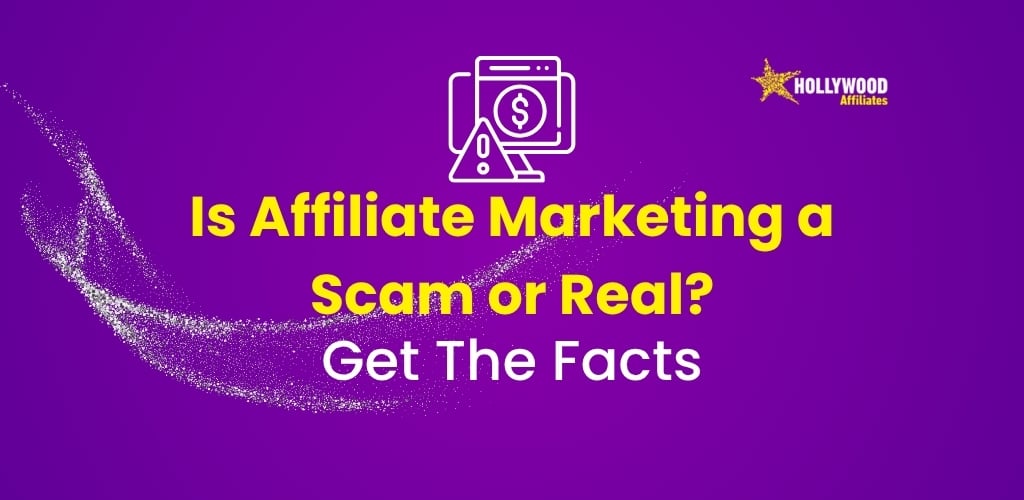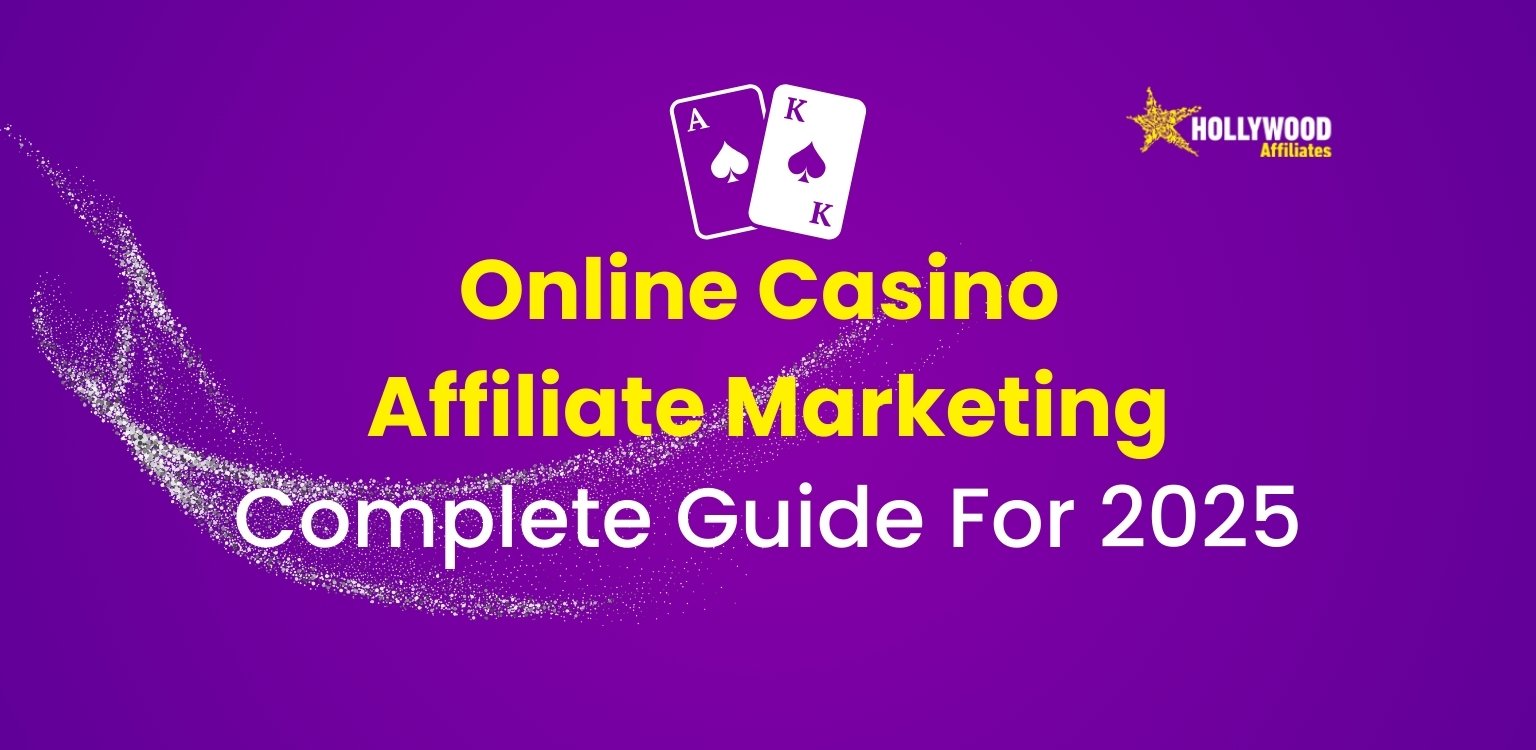Discover How to Become an Affiliate Marketer and Make a Full-time Living in 2025

Ever wondered how to become an affiliate marketer? Unlock the potential to earn passive income while working from anywhere in the world. We’ve compiled a guide explaining what affiliate marketing is, how it works, some of the pros and cons of affiliate marketing and how you can create a successful business by following a few key steps.
Table of Contents
Introduction to Affiliate Marketing
Affiliate marketing as we know it launched at around the same time as the beginning of the Internet in the late 1980s and early 1990s. It started as a simple, cost-effective advertising model where the affiliate placed banners or links leading to different business’ sites on their own website. This allowed the affiliate to receive a commission if a visitor made a purchase through their link.
Affiliate marketing has grown exponentially in size, complexity and sophistication over the past 30 years. It so drastically changed the digital marketing landscape over the last five years that Astute Analytica suggests the global affiliate marketing industry grew to over $20 billion by the end of 2024.
Boosted by the immense growth of the internet; the increase in online retail and the rapid rise of social media, affiliate marketing now also includes bloggers, vloggers and influencers. They are used to help improve brand sales and awareness; attract more web traffic and customers and connect with the audience of the company the affiliate is advertising.
For example, a yoga studio could partner with a popular yoga influencer with a YouTube channel to reach their audience of subscribers. Through the influencer’s efforts, the yoga studio could earn new sign-ups and boost sales for its bundle packages. Some of the new customers could also go on to become permanent members of the yoga studio. The influencer benefits from earning commission and other rewards. It’s a win-win as yoga studio, yoga influencer and yoga enthusiast have all benefitted.
How it works:
The affiliate marketing process works through the relationship between four main participants: the business (aka company, merchant or brand); the affiliate; the affiliate network and the customer.
Each of these participants plays a unique part in the process:
- The business. This is an individual or company selling the product or service that an affiliate promotes.
- The affiliate (also referred to as “the publisher”) This is the individual who promotes a business’s product or service on their online platforms.
- The affiliate network. A network that connects affiliate marketers to a merchant’s affiliate marketing program. While affiliates and businesses can operate outside an affiliate network, this is the exception and not the norm in the affiliate marketing industry.
- The customer. The customer is any person or entity who purchases a product through an affiliate. Merchants partner with affiliates to gain access to the affiliate’s targeted audiences and convert them into customers.
A primary goal of this process is to connect affiliates with businesses in order to help both parties achieve objectives such as boosting sales and raising brand awareness. This leads to bigger sales for the business and bigger commissions for the affiliate.
Okay, so we’ve explained what affiliate marketing is and how you could start your own successful affiliate marketing operation. But what might be some potential challenges you may encounter when you start?
The Pros and Cons of Becoming an Affiliate Marketer
Pros:
- Potential for High Earnings. Successful affiliate marketers can generate a sizeable income if they manage to build a large and engaged audience.
- Independence. Affiliate marketers have the freedom to be their own boss, set their own goals, and work on their own terms.
- Scalability. You can grow your business by promoting more products and increasing your marketing efforts. This will help you expand into new niches as you gain traction online.
- Diverse Skill Development. You will develop a wide range of skills such as including digital marketing; SEO and SEM; content creation, and data analysis.
- Networking Opportunities. You will have the chance to connect with other marketers, brands, and industry professionals, which can open further opportunities.
Cons:
- Income Variability. The opportunities earn a strong and steady income are plentiful. However, your earnings can also fluctuate based on market trends, changes in affiliate programs, and other external factors.
- High Competition. The field is highly competitive. Being consistently innovative improves your efforts to stay ahead and attract traffic.
- Dependence on Third Parties. You don’t control the market in which the brands you represent operate. You also have no control over their product or marketing strategies. Your success is tied to the performance and policies of these brands and the affiliate marketing programs they operate. These can change at short notice.
- Work-Life Balance Challenges. It takes a particular personality to be comfortable with the unconventional structure of life as a full-time professional affiliate marketer. Much discipline is required, as the independence and flexibility you have can lead to both overworking and under-performing.
- Initial Investment of Time and Effort. Overnight success is rare. More often than not, it is a long and difficult journey. Building a solid affiliate marketing business requires a significant upfront investment in time and effort before seeing substantial returns.
Ultimately, affiliate marketing is the classic case of “what you put in is what you get out.” Be inspired by this story of how innovative affiliate marketing methods led to great success for both brand and affiliate. Interstitial & iGaming traffic combo: 236,12% ROI
How to Become an Affiliate Marketer
So, now you know a bit more about what affiliate marketing is and how it works. Let’s dive into some of the steps to complete in order to start your own affiliate marketing business and thrive.
Although becoming a successful affiliate marketer is a jam-packed journey, there are some key tips you can pick up from industry best practice.
Skills to Develop
- Networking. Building strong relationships with other marketers, influencers, and industry professionals builds a strong platform. Networking can give you valuable insights, support, and opportunities for collaboration.
- Time Management. Developing effective time management skills is of great benefit. This helps to structure your work life by balancing content creation, marketing efforts and other tasks involved in making your affiliate marketing business a success.
- Adaptability. Stay up to date with industry trends and be willing to adapt your strategies. The digital marketing landscape is constantly evolving; being flexible is key to long-term success.
Step 1: Choose the Right Niche and Products
Finding the industry niche or target audience that resonates with your own passions is highly recommended. Being familiar with the market helps, although in-depth research into market trends and consumer behaviour is mandatory. The industry – or industries – in which you choose to pursue your affiliate marketing goals depends on various factors.
Are you drawn to them for personal reasons, because they have strong earning potential, or a combination of both? Whatever the case, use research tools like Google Trends while conducting research upon both your audience and competitors in the same niche.
Targeting a specific industry niche helps you devise a strategy for a specific audience. Many experienced affiliate marketers recommend combining your affiliate marketing business with your personal interests. Doing so in an area with good market demand can only increase your chances of success.
Last but not least, ensure you are well versed in the various commission and payment structures in place. You most certainly don’t want to find yourself expending great effort for little reward.
Step 2: Find Affiliate Programs to Sign Up For
Look for and learn how different affiliate programs work. What are the Ts & Cs? What support will you receive? How competitive is the niche? What payment model does the affiliate marketing program make use of? Pay-per-click; pay-per-lead; pay-per-sale or commission? Which is best suited for you? Try to sign up for affiliate programs that align with both your passion and business objectives.
While it’s not always necessary to join an affiliate program, these provide you with the tools to make it easier to build relationships customers and increase your potential to earn affiliate commissions. There are innumerable affiliate networks you can join today. Some examples include Hollywoodbets Affiliates, Amazon Associates, ShareASale, and Rakuten.
Step 3: Set Up a Website, Blog, or Social Media Page
Building solid marketing channels is the best way to grow your affiliate marketing business and increase your earnings in 2025. Learning technical skills such as website development and Customer Retention Management (CRM) is highly recommended. Becoming familiar with platforms such as WordPress and HubSpot is crucial to your success as an affiliate marketer as your platforms are the primary means whereby you reach your audience.
With WordPress you can create, edit and evolve a website and manage all the necessary plugins. To increase your online visibility, a sound strategy is to create a regularly-updated blog and leverage social media platforms such as LinkedIn, Facebook, YouTube or X where you can promote and recommend products.
Step 4: Create Valuable Content
Becoming a successful affiliate marketer in 2025 means becoming an ace at content creation. You’ll need to learn how to create high-quality original content in a variety of mediums that captures your audience’s attention and shows your value to merchants. This includes writing blog posts, creating videos and designing graphics.
Having a basic understanding of the creative principles of copywriting, video and design will help you come up with compelling and persuasive content that encourages your audience to take the actions you want them to take, such as clicking on your affiliate links.
Whether you’re making YouTube videos, Instagram reels or publishing content on your site with WordPress, your content will need to have uniform quality across all platforms. Ensure you’re aligned with the latest trends on those platforms and place your content where it will perform.
Step 5: Add in Your Affiliate Links
Strategically integrate your affiliate links into your content. Overloading your audience with too many products or too much of the same product could make them lose interest and steer clear of your content. Placing your affiliate links into your content smartly so they fit naturally, don’t detract from your content and provide clear calls to action.
Step 6: Drive Traffic to Your Platform
Driving audiences to your platform will require you to use different digital marketing strategies and traffic sources such as Search Engine Optimisation (SEO), Search Engine Marketing (SEM), content marketing, email marketing and social media marketing. Again, research is your primary tool. Research these strategies and learn how make the different tools they use work to your advantage. Pay attention to well-know case-studies of success to learn from those who have blazed a trail.
Learn how to use unpaid search strategies such as keyword placement to ensure your blogs appear at the top of the list in the Search Engine Ranking Pages (SERPs). Paid strategies such as Google Ads and boosted social media posts increase the amount of eyeballs on your content. The more visitors you have, the higher the chances of earning commissions.
Step 7: Track and Optimise Your Traffic and Conversions
Grow comfortable with tracking tools to check on your website’s performance. Doing regular checks and analysing how well your content is performing will help you understand what’s working and where you need to improve. There are many tracking tools such as Google Analytics and Voluum at your disposal.
Further Tools and Resources
Check out the this stellar opinion piece: Affiliate Marketing Mastery by Matt Diggity and be sure to visit our site. It’s jam-packed with useful advice, suggestions, strategies, methodologies, tips, lessons and experiences to help you master the art of affiliate marketing and earn money from passive income streams. We’d love it if you shared your own experiences and asked some questions in the comments section. Sign up to the newsletter for a regular supply of insights and updates.
Frequently Asked Questions (FAQs)
Q: Why become an Affiliate Marketer?
A: Becoming an affiliate marketer offers numerous benefits, including the opportunity to earn a high income, being able to work from anywhere and the ability to create passive income streams. It also allows you to develop diverse skills in digital marketing, content creation, and analytics, while building valuable relationships within the industry.
Q: How do I start affiliate marketing as a beginner?
A: Apply to Hollywoodbets Affiliates, ensure you meet all the criteria and complete the registration form. Simply click on “Register,” fill out the form, and you will receive a notification upon successful submission.
Q: What is the difference between affiliate marketing and digital marketing?
A: Even though the two terms are related, they’re not the same. Digital marketing is a broad umbrella that includes all online marketing activities. Affiliate marketing is one such activity that focuses specifically on being able to earn commissions by promoting products for various businesses and brands.

Ruaan Kleynhans
Senior Affiliate Marketing Specialist
Fueled by a passion for performance and precision, this seasoned professional has carved a niche in the fast-paced world of online gambling and casino marketing. With years of hands-on experience as a Key Affiliate Account Manager, he blends deep industry knowledge with cutting-edge digital marketing strategies to deliver outstanding results. Renowned for his ability to nurture VIP casino clients and harness analytics for actionable insights, he brings a data-driven mindset to every challenge.





